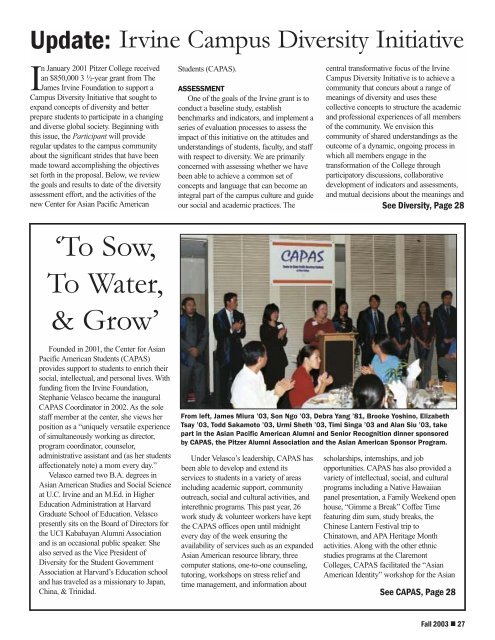Fall 2003 Participant - Pitzer College
Fall 2003 Participant - Pitzer College
Fall 2003 Participant - Pitzer College
Create successful ePaper yourself
Turn your PDF publications into a flip-book with our unique Google optimized e-Paper software.
Update:<br />
Irvine Campus Diversity Initiative<br />
In January 2001 <strong>Pitzer</strong> <strong>College</strong> received<br />
an $850,000 3 ½-year grant from The<br />
James Irvine Foundation to support a<br />
Campus Diversity Initiative that sought to<br />
expand concepts of diversity and better<br />
prepare students to participate in a changing<br />
and diverse global society. Beginning with<br />
this issue, the <strong>Participant</strong> will provide<br />
regular updates to the campus community<br />
about the significant strides that have been<br />
made toward accomplishing the objectives<br />
set forth in the proposal. Below, we review<br />
the goals and results to date of the diversity<br />
assessment effort, and the activities of the<br />
new Center for Asian Pacific American<br />
Students (CAPAS).<br />
ASSESSMENT<br />
One of the goals of the Irvine grant is to<br />
conduct a baseline study, establish<br />
benchmarks and indicators, and implement a<br />
series of evaluation processes to assess the<br />
impact of this initiative on the attitudes and<br />
understandings of students, faculty, and staff<br />
with respect to diversity. We are primarily<br />
concerned with assessing whether we have<br />
been able to achieve a common set of<br />
concepts and language that can become an<br />
integral part of the campus culture and guide<br />
our social and academic practices. The<br />
central transformative focus of the Irvine<br />
Campus Diversity Initiative is to achieve a<br />
community that concurs about a range of<br />
meanings of diversity and uses these<br />
collective concepts to structure the academic<br />
and professional experiences of all members<br />
of the community. We envision this<br />
community of shared understandings as the<br />
outcome of a dynamic, ongoing process in<br />
which all members engage in the<br />
transformation of the <strong>College</strong> through<br />
participatory discussions, collaborative<br />
development of indicators and assessments,<br />
and mutual decisions about the meanings and<br />
See Diversity, Page 28<br />
‘To Sow,<br />
To Water,<br />
& Grow’<br />
Founded in 2001, the Center for Asian<br />
Pacific American Students (CAPAS)<br />
provides support to students to enrich their<br />
social, intellectual, and personal lives. With<br />
funding from the Irvine Foundation,<br />
Stephanie Velasco became the inaugural<br />
CAPAS Coordinator in 2002. As the sole<br />
staff member at the center, she views her<br />
position as a “uniquely versatile experience<br />
of simultaneously working as director,<br />
program coordinator, counselor,<br />
administrative assistant and (as her students<br />
affectionately note) a mom every day.”<br />
Velasco earned two B.A. degrees in<br />
Asian American Studies and Social Science<br />
at U.C. Irvine and an M.Ed. in Higher<br />
Education Administration at Harvard<br />
Graduate School of Education. Velasco<br />
presently sits on the Board of Directors for<br />
the UCI Kababayan Alumni Association<br />
and is an occasional public speaker. She<br />
also served as the Vice President of<br />
Diversity for the Student Government<br />
Association at Harvard’s Education school<br />
and has traveled as a missionary to Japan,<br />
China, & Trinidad.<br />
From left, James Miura ’03, Son Ngo ’03, Debra Yang ’81, Brooke Yoshino, Elizabeth<br />
Tsay ’03, Todd Sakamoto ’03, Urmi Sheth ’03, Timi Singa ’03 and Alan Siu ’03, take<br />
part in the Asian Pacific American Alumni and Senior Recognition dinner sponsored<br />
by CAPAS, the <strong>Pitzer</strong> Alumni Association and the Asian American Sponsor Program.<br />
Under Velasco’s leadership, CAPAS has<br />
been able to develop and extend its<br />
services to students in a variety of areas<br />
including academic support, community<br />
outreach, social and cultural activities, and<br />
interethnic programs. This past year, 26<br />
work study & volunteer workers have kept<br />
the CAPAS offices open until midnight<br />
every day of the week ensuring the<br />
availability of services such as an expanded<br />
Asian American resource library, three<br />
computer stations, one-to-one counseling,<br />
tutoring, workshops on stress relief and<br />
time management, and information about<br />
scholarships, internships, and job<br />
opportunities. CAPAS has also provided a<br />
variety of intellectual, social, and cultural<br />
programs including a Native Hawaiian<br />
panel presentation, a Family Weekend open<br />
house, “Gimme a Break” Coffee Time<br />
featuring dim sum, study breaks, the<br />
Chinese Lantern Festival trip to<br />
Chinatown, and APA Heritage Month<br />
activities. Along with the other ethnic<br />
studies programs at the Claremont<br />
<strong>College</strong>s, CAPAS facilitated the “Asian<br />
American Identity” workshop for the Asian<br />
See CAPAS, Page 28<br />
<strong>Fall</strong> <strong>2003</strong> 27






![Anticipated Courses SP14 [pdf] - Pomona College](https://img.yumpu.com/25363335/1/190x245/anticipated-courses-sp14-pdf-pomona-college.jpg?quality=85)










